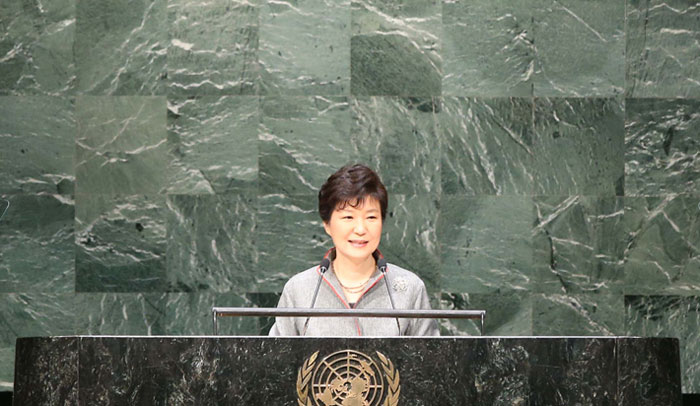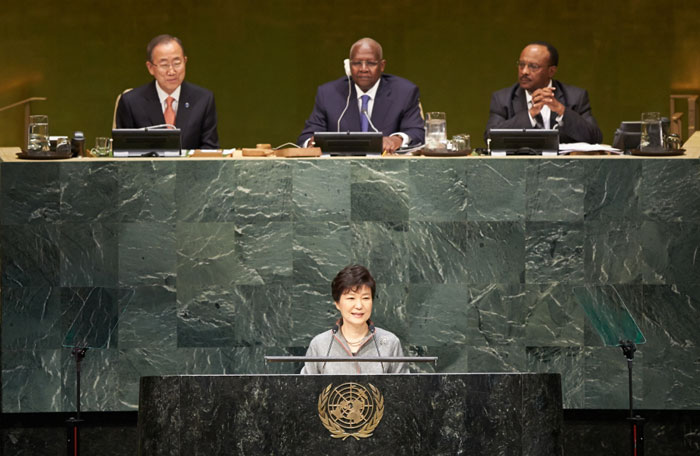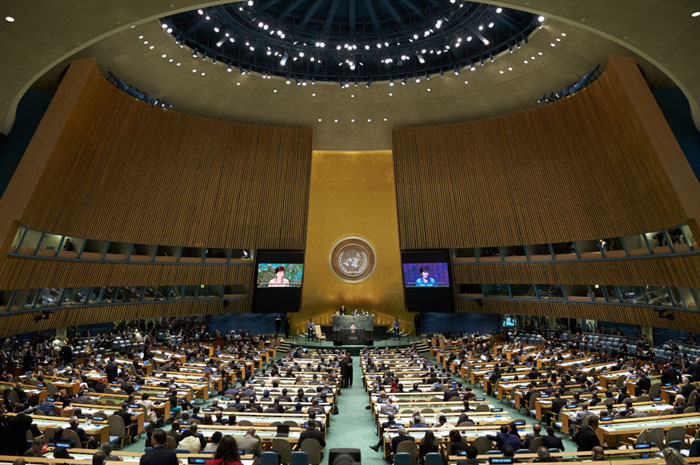President Park Geun-hye delivered the keynote speech at the 69th U.N. General Assembly on September 24, a first for her time in office.
The global meeting was held under the theme of “Delivering on and Implementing a Transformative Post-2015 Development Agenda.”



President Park emphasized that the U.N. should go back to where it began, with its human-centered goals and international cooperation, and play a central role in effectively responding to new, simultaneous threats and challenges, such as the continued conflicts in the Middle East and African regions, terrorism targeting foreigners in Iraq, the Ukrainian crisis and the Ebola epidemic.
In regard to global peace, Park stressed the need to resolve the North Korean nuclear issue and urged Pyongyang to make a strategic choice by giving up its nuclear weapons in exchange for economic development. The president explained her Northeast Asian peace vision, which is designed to solve regional conflicts concerning history, territory and ocean security and to build trust and cooperation between neighboring countries. She further explained the need to form a nuclear power safety body in Northeast Asia and discussed the ongoing efforts to build cooperation across Eurasia.
In regard to human rights, Park expressed her strong support for the U.N.’s strengthened policy on human rights. She highlighted the fact that at any time or any place sexual violence against women during wartime violates all human rights and all types of humanitarianism.
Regarding North Korean human rights issues in particular, Park urged Pyongyang and the international community to take the necessary measures to implement the recommendations made by the Commission of Inquiry (COI) under the U.N. Human Rights Council. She called for cooperation between the U.N. and other countries to protect the human rights of North Korean defectors so that they can implement their own free will to choose their final destination.
Concerning economic development, education and the environment, Park said that the Korean government will play a bridging role in achieving U.N. development goals after 2015, and that it is in the process of establishing a post-2020 New Climate Regime. The president said she will actively support sharing with other countries Korea’s experiences with its New Community Movement, or Saemaeul Undong, the Korean government's rural development program. The president also noted that Korea will be hosting the World Education Forum in 2015. She underlined the need to reach an agreement on the post-2020 New Climate Regime. Park further urged the international community to make efforts and to contribute to helping developing countries grow the capabilities to respond to climate change, as Korea led the establishment of the Green Climate Fund and the Global Green Growth Institute (GGGI).
President Park explained in detail her administration’s policy toward a peaceful reunification of the Korean Peninsula and noted that reunification would contribute to the foundation goals of the U.N. and to its noble values. She emphasized that a reunified Korean Peninsula would be the starting point for a world without nuclear weapons, would be a fundamental solution to human rights abuses, and that it would be the beginning point to realize a newly stabilized and cooperative Northeast Asia.
In regard to her proposal to take small environmental steps to improve the livelihood of the people -- a policy she proposed in her August 15 Liberation Day speech -- the president stated that Seoul hopes to build a world peace park in the demilitarized zone. She said this park would become the starting point to reconnect nature with a people that has been divided into south and north for over 60 years. In this regard, she asked for support from the U.N. and the international community to help Korea reach these goals.
By Wi Tack-whan, Yoon Sojung
Korea.net Staff Writers
whan23@korea.kr
The global meeting was held under the theme of “Delivering on and Implementing a Transformative Post-2015 Development Agenda.”

President Park Geun-hye delivers the keynote speech during the general debate session of the 69th U.N. General Assembly at U.N. headquarters in New York on September 24. (photo: Yonhap News)


Participants in the general debate session of the 69th U.N. General Assembly listen to President Park Geun-hye's keynote speech on September 24. (photos: Cheong Wa Dae)
President Park emphasized that the U.N. should go back to where it began, with its human-centered goals and international cooperation, and play a central role in effectively responding to new, simultaneous threats and challenges, such as the continued conflicts in the Middle East and African regions, terrorism targeting foreigners in Iraq, the Ukrainian crisis and the Ebola epidemic.
In regard to global peace, Park stressed the need to resolve the North Korean nuclear issue and urged Pyongyang to make a strategic choice by giving up its nuclear weapons in exchange for economic development. The president explained her Northeast Asian peace vision, which is designed to solve regional conflicts concerning history, territory and ocean security and to build trust and cooperation between neighboring countries. She further explained the need to form a nuclear power safety body in Northeast Asia and discussed the ongoing efforts to build cooperation across Eurasia.
In regard to human rights, Park expressed her strong support for the U.N.’s strengthened policy on human rights. She highlighted the fact that at any time or any place sexual violence against women during wartime violates all human rights and all types of humanitarianism.
Regarding North Korean human rights issues in particular, Park urged Pyongyang and the international community to take the necessary measures to implement the recommendations made by the Commission of Inquiry (COI) under the U.N. Human Rights Council. She called for cooperation between the U.N. and other countries to protect the human rights of North Korean defectors so that they can implement their own free will to choose their final destination.
Concerning economic development, education and the environment, Park said that the Korean government will play a bridging role in achieving U.N. development goals after 2015, and that it is in the process of establishing a post-2020 New Climate Regime. The president said she will actively support sharing with other countries Korea’s experiences with its New Community Movement, or Saemaeul Undong, the Korean government's rural development program. The president also noted that Korea will be hosting the World Education Forum in 2015. She underlined the need to reach an agreement on the post-2020 New Climate Regime. Park further urged the international community to make efforts and to contribute to helping developing countries grow the capabilities to respond to climate change, as Korea led the establishment of the Green Climate Fund and the Global Green Growth Institute (GGGI).
President Park explained in detail her administration’s policy toward a peaceful reunification of the Korean Peninsula and noted that reunification would contribute to the foundation goals of the U.N. and to its noble values. She emphasized that a reunified Korean Peninsula would be the starting point for a world without nuclear weapons, would be a fundamental solution to human rights abuses, and that it would be the beginning point to realize a newly stabilized and cooperative Northeast Asia.
In regard to her proposal to take small environmental steps to improve the livelihood of the people -- a policy she proposed in her August 15 Liberation Day speech -- the president stated that Seoul hopes to build a world peace park in the demilitarized zone. She said this park would become the starting point to reconnect nature with a people that has been divided into south and north for over 60 years. In this regard, she asked for support from the U.N. and the international community to help Korea reach these goals.
By Wi Tack-whan, Yoon Sojung
Korea.net Staff Writers
whan23@korea.kr